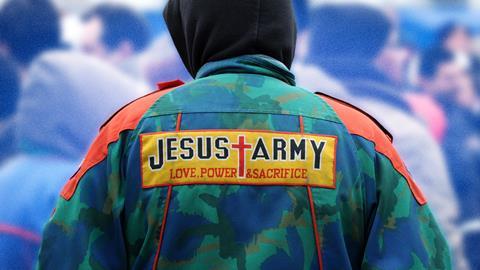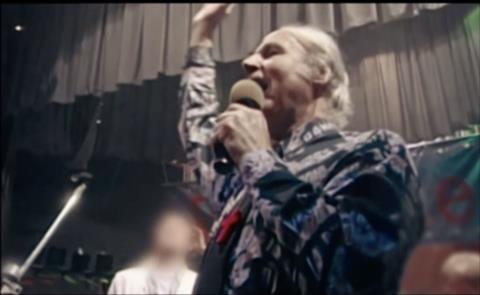Exec producer and founder of Big Sister Films Katie Buchanan on why the time was right to make Inside the Cult of the Jesus Army
Production Companies: Big Sister Films, Docsville Studios
TX: Available on iPlayer from 27 July, and Episode 2 to air on BBC Two 9pm, 3 August
Distributor: Fremantle is handling worldwide sales
Runtime: 2 x 60’
Director: Ellena Wood
To anyone living in London in the 1990s, the Jesus Army with their fluorescent crosses and double-decker buses, were a familiar sight, so when I came across a BBC news item in 2019 that they were closing down following an abuse scandal, there was an immediate prick of interest.

I was surprised that it wasn’t a bigger story – but it soon became clear why. Up until that point only a few survivors had dared to go public and it was easy to dismiss the abuse they’d experienced as the work of a few ‘rotten apples’. The Church of England was facing its own crisis at the time, the Independent Inquiry into Child Sexual Abuse was in full swing and this felt like a bit of sideshow.
But it didn’t take long to realise that there was more here than just an abuse scandal. Despite calling themselves a church and following some of the broader principles of evangelical Christianity, it soon become obvious that what we were looking at was quite possibly one of the largest and most harmful cults in UK history.
There are several internationally recognised sets of criteria for defining a cult – these generally include the use of thought control (brainwashing) and having a leader who cuts you off from the outside world. It’s not an exact science, and not everyone within the Jesus Army will see it the same way, but to many brought up in their community homes, the Jesus Army ticked every box.
But how to tell the story? The coercive control survivors had experienced was very hard to shake off, but timing was on our side and with the launch of the redress compensation scheme in 2022, many were starting to re-examine their past. I realised this was a rare opportunity to shape a story while it was still evolving.
It was obvious that this wasn’t something to embark upon lightly, but having met survivors I knew we simply couldn’t let them down. The central narrative arc of victims banding together to help bring down a dangerous organisation was something I knew would resonate. My company Big Sister Films had secured access to an extraordinary counselling workshop run by Gillie Jenkinson of Hope Valley Counselling which was helping survivors walk free after years of indoctrination. Our initial plan was to focus more on the present day, but when I started talking to Daisy Scalchi, commissioning editor for Religion and Ethics at the BBC, we began to consider a different approach – one that would take in the full span of the Jesus Fellowship’s fifty-year story.

We were helped by finding former Jesus Fellowship Elders who also felt that the time was right to tell their side of the story. With great courage, they told us of the founding principles of the Jesus Fellowship and how these were gradually eroded from within by the unchecked power of its leader Noel Stanton.
It’s a cliché to talk about abusers hiding in plain sight, but this wasn’t an organisation that hid away. At various times in its history, it courted publicity and on several different occasions invited the cameras into its community homes. This meant there was a wealth of archive to draw upon. We were also helped by a treasure trove of documentation laying down, in black and white, some of the more extreme elements of community life.
As the redress scheme drew to a close in 2023, figures released by the Jesus Fellowship Community Trust made for staggering reading. Some 539 alleged abusers had been identified, 264 of these from within the Jesus Fellowship. One in 6 children brought up within the community were thought to have been sexually abused. Perhaps most damning of all, 33 allegations had been made against former leader Noel Stanton – including the sexual abuse of children. He had died before he could be brought to justice, but it’s hard to argue against the idea that there was institutional failure when the leader himself is unmasked as a likely abuser. For some of our contributors this was an acutely painful moment when they had to face up to the reality of what they had been involved with.
Making documentaries with people who have experienced great trauma is never easy, as director Ellena Wood describes [see box], but as further stories of abuse within the Jesus Army are revealed and a Parliamentary Working Group steps up its campaign to make coercive control by organisations as a crime, it’s deeply satisfying to know that documentaries like the one we’ve made can have a quantifiable impact on people’s lives.
- Inside the Cult of the Jesus Army is available on iPlayer now
Supporting survivors to share their stories
Ellena Wood, producer and series director
I was incredibly aware when taking on the subject of the Jesus Army that almost no former member had told their story or spoken publicly before, and of what a huge responsibility this would be. I started developing the series in 2022, and over the next year would end up speaking to more than 80 former members. What became clear was that had we tried to tell the story of the Jesus Army any sooner, we may have failed.
The fact the church had closed three years earlier, and a compensation scheme was about to launch, meant former members were finally ready to start speaking. One of the many ways in which the church controlled its members was to remove their voices and gaslight them, dismissing their abuse and the resulting trauma. They saw these films as a chance to finally be heard, and most importantly to be believed.
Duty of care was front and centre in our approach. We knew that even the act of someone recounting their abuse could retraumatise them, even when they wanted to speak. I would make people aware of this before they recounted their story and would offer support from our psychologist afterwards should they need it. After many, many hours of listening, I developed an insight and an understanding of the church that few people outside of it had.
From the many amazing people who shared their stories with me, I learned the lingo, the patterns, the controls, and the many types of abuses carried out. This alone had a profound impact on survivors. The very fact that someone outside the church understood and believed it had happened blew their minds.
Perhaps most importantly, the fact I could understand how they came to be part of a cult, and why it was so hard to leave, meant that some of their shame started to dissipate. In the end, I believe this is what led many people to want to take part – they felt that if talking to just one person could have this effect, imagine what sharing their stories with thousands of people could do.









No comments yet